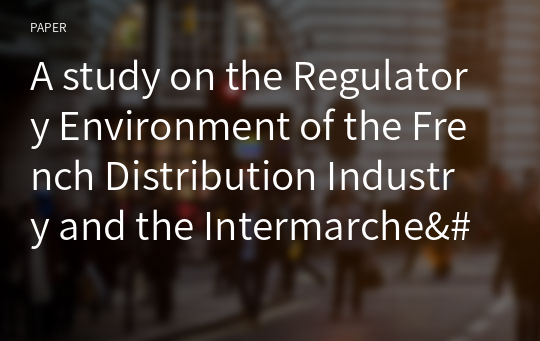A study on the Regulatory Environment of the French Distribution Industry and the Intermarche's Management strategies
(주)코리아스칼라
- 최초 등록일
- 2016.04.02
- 최종 저작일
- 2012.03
- 10페이지/
 어도비 PDF
어도비 PDF
- 가격 4,000원

* 본 문서는 배포용으로 복사 및 편집이 불가합니다.
서지정보
ㆍ발행기관 : 한국유통과학회
ㆍ수록지정보 : The Journal of Industrial Distribution & Business / 3권 / 1호
ㆍ저자명 : In-Sik Choi, Sang-Youn Lee
영어 초록
Despite the enforcement of SSM control laws such as 'the Law of Developing the Distribution Industry (LDDI)‘ and ‘the Law of Promoting Mutual Cooperation between Large and Small/medium Enterprises (LPMC)’ stipulating the business adjustment system, the number of super-supermarkets (SSMs) has ever been expanding in Korea. In France, however, Super Centers are being regulated most strongly and directly in the whole Europe viewing that there is not a single SSM in Paris, which is emphasized to be the outcome from French government's regulation exerted on the opening of large scale retail stores. In France, the authority to approve store opening is deeply centralized and the store opening regulation is a socio-economic regulation driven by economic laws whereas EU strongly regulates the distribution industry. To control the French distribution industry, such seven laws and regulations as Commission départementale d'urbanisme commercial guidelines (CDLIC) (1969), the Royer Law (1973), the Doubin Law (1990), the Sapin Law (1993), the Raffarin Law (1996), solidarite et renouvellement urbains (SRU) (2000), and Loi de modernisation de l'économie (LME) (2009) have been promulgated one by one since the amendment of the Fontanet guidelines, through which commercial adjustment laws and regulations have been complemented and reinforced while regulatory measures have been taken. Even in the course of forming such strong regulatory laws, InterMarche, the largest supermarket chain in France, has been in existence as a global enterprise specialized in retail distribution with over 4,000 stores in Europe. InterMarche's business can be divided largely into two segments of food and non-food. As a supermarket chain, InterMarche's food segment has 2,300 stores in Europe and as a hard-discounter store chain in France, Netto has 420 stores. Restaumarch is a chain of traditional family restaurants and the steak house restaurant chain of Poivre Rouge has 4 restaurants currently. In addition, there are others like Ecomarche which is a supermarket chain for small and medium cities. In the non-food segment, the DIY and gardening chain of Bricomarche has a total of 620 stores in Europe. And the car-related chain of Roady has a total of 158 stores in Europe. There is the clothing chain of Veti as well.In view of InterMarche's management strategies, since its distribution strategy is to sell goods at cheap prices, buying goods cheap only is not enough. In other words, in order to sell goods cheap, it is all important to buy goods cheap, manage them cheap, systemize them cheap, and transport them cheap. In quality assurance, InterMarche has guaranteed the purchase safety for consumers by providing its own private brand products. InterMarche has 90 private brands of its own, thus being the retailer with the largest number of distributor brands in France. In view of its IT service strategy, InterMarche is utilizing a high performance IT system so as to obtainas much of the market information as possible and also to find out the best locations for opening stores. In its global expansion strategy of international alliance, InterMarche has established the ALDIS group together with the distribution enterprises of both Spain and Germany in order to expand its food purchase, whereas in the non-food segment, it has established the ARENA group in alliance with 11 international distribution enterprises. Such strategies of InterMarche have been intended to find out the consumer needs for both price and quality of goods and to secure the purchase and supply networks which are closely localized. It is necessary to cope promptly with the constantly changing circumstances through being unified with relevant regions and by providing diversified customer services as well. In view of the InterMarche's positive policy for promoting local partnerships as well as the assistance for enhancing the local economic structure, implications are existing for those retail distributors of our country.
참고 자료
없음
"The Journal of Industrial Distribution & Business"의 다른 논문

























